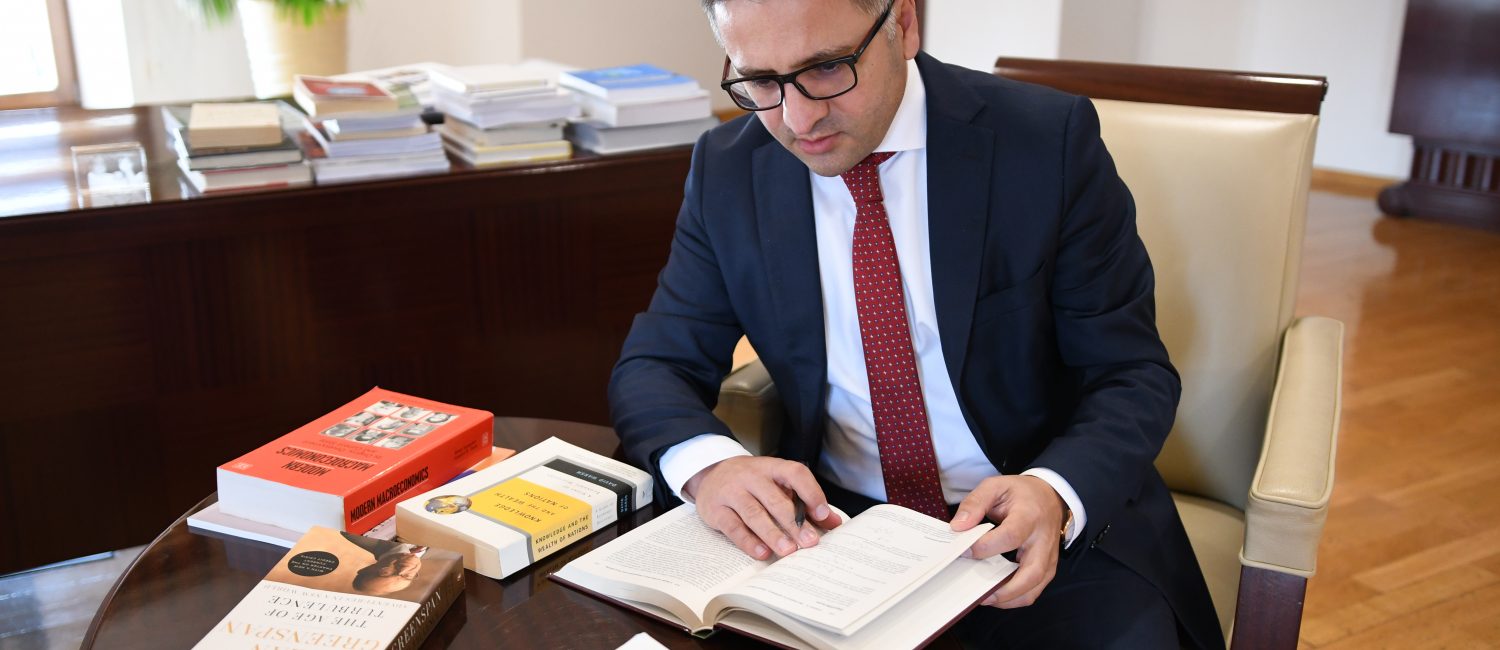29th July 2023, Skopje – The United Nations General Assembly, on 22nd December 2005, by resolution 60/209 identified solidarity as one of the fundamental and universal values that should underlie relations between people in the twenty-first century, and in that regard decided to proclaim 20th December as international Human Solidarity Day. In December 2022, we coincidentally launched public debates and consultations on the solidarity tax.
Solidarity tax concept is based upon unity social responsibility and fairness. These are the three principles or the three pillars upon which the solution relies.
Unity: In the past three years, almost EUR 2 billion from the State Budget was allocated as measures geared towards the business sector and the citizens in need therefor. All of us, as taxpayers, used these funds so as to support those who needed them the most. Hence, the purchasing power was preserved, and the creditworthiness and the payment capacity of many of our citizens were also improved, thus allowing the companies affected by the crisis to pursue their day-to-day business activities. Otherwise, the recession would have been much deeper, and unemployment would have deviated from its ongoing downward trend and would have been at a much higher level. Solidarity tax has the same purpose – providing budget funds for the P1 Program (or more familiar to the public as an anti-crisis program), through which all anti-crisis measures were and will be paid. Although as per the economic theory, taxes are non-targeted income, however, the solidarity tax income, as extra-ordinary and one-off tax, will provide for financing the anti-crisis program.
Social responsibility: In times of crisis, there are always certain sectors and companies benefiting from the developments and generating higher profit therefrom. Returning part of the profit for the purpose of supporting the economy, in view of its development and social affairs, is a social responsibility. Social responsibility entails supporting the society, thus creating conditions that provide for better living standard.
Fairness: We should all pay our fair share of the duties, thus leading to a prosperous economy, as well as society as a whole. In essence, each tax system is based upon a contribution proportional to the earnings/the profit. Most successful people should keep acting as a driving force contributing to a better society.
“Solidarity” is a moral phenomenon pertaining to a mutual aid or cooperation between individuals and groups, particularly in difficult circumstances and crises. Therefore, I believe that the name “Solidarity Tax Law” fits just right the legal solution discussed in the Parliament, which was originally titled as Law on Extra Profit Tax.
Throughout economic history, both recent and distant, we have encountered plenty of examples related to solidarity tax, such as in: France in the eighties, Germany in the nineties of the last century, and as of recently France, Spain, Croatia, Hungary, Italy, Poland, the Czech Republic, Belgium, etc. Solidarity tax is a tax levied by a government to fund socially unifying projects or activities. Thus, in France, solidarity tax is levied on high revenues or high property value. In Germany, the solidarity tax was introduced to rebuild East Germany, thus to raise funds in support of the economy. Given the sharp rise in prices in the energy sector last year, several European countries announced and implemented solidarity laws, also incorporating companies prospering during that period (however, I will elaborate on these examples below). I would like to hereby stress that solidarity taxes have been applied throughout the history until nowadays in many countries. Their primary goals is improving the developments in the economy and the society.
For the purpose of accomplishing fiscal sustainability via fiscal consolidation, which entails, among the other things, improving the revenue collection, last year, upon broad consultation with the business, expert and international public, implementation of the tax reform was launched, being based upon expanded tax base. Tax reform implementation is an extensive process, which will be carried out in several stages, which is mostly based upon the fairness principles, as already being mentioned in my previous columns.
Harmonization with the EU Acquis and Following the IMF Recommendations
Solidarity tax, as a one-off levy, is part of this process. This proposal arose from the Tax Reform Strategy, as well as the EU Council Regulation (2022/1854) on an Emergency Intervention to Address High Energy Prices, adopted on 6th October 2022. This Regulation foresees adoption of exceptional and time-limited measures, also including mandatory temporary solidarity contribution by the profitable companies in the energy sector. Most of the EU Member States launched, in line with the adopted Regulation, legal amendments related to additional one-off levies on the energy sector entities earning extra profit. However, due to the price crisis, many EU countries also introduced taxes on extra profit for companies dealing in other activities (Croatia, Hungary, etc.). In view of the COVID-19 induced crisis, as well as the energy crisis, solidarity tax was also recommended in several IMF studies and analyses.
Inclusive process: Consultations with the Business Community and the Opposition Parties
Upon designing the draft- Solution on the Solidarity Tax, by following the suit of some EU countries, during December last year, Ministry of Finance conducted an inclusive consultation process with the business community. The draft Law was initially submitted to the chambers of commerce, for discussion, whereby on 23rd December 2022, meeting was held in the Ministry of Finance with representatives of the largest chambers of commerce. During the meeting, we presented the draft law and the reasons therefor, while also explaining the fundamentals of the EU Council Regulation and the Croatian draft Law on Solidarity, being most similar to ours. Representatives of the chambers of commerce expressed consideration of the developments in the country, also taking into account the sets of measures in support of the economy, as the adequate actions taken by the Government in the past period, thereby also highlighting that the large companies should, amid such difficult circumstances, show solidarity as regards the public interest, as well as the small businesses. Representatives of the business community were involved in designing the legal solution. Upon the discussions, they presented proposals for improving the draft Law. Despite the business community, for the sake of discussing the Law with all stakeholders, meeting with the largest opposition party was held as well.
Who is Affected by the Solidarity Tax and to What Extent?
Upon completing the consultation process, we reviewed all proposals, while incorporating a great deal of them into the legal solution. As per the solution, the solidarity tax is paid by the taxpayer subject to profit tax, generating a total income higher than Denar 615 million (EUR 10 million) in 2022. Thereby, profit after deduction, also including the deductions related to reinvested profit, is the tax base. Solidarity tax base is the profit after deduction generated in 2022 or the average of 2021 and 2022 (the company considers the favourable option), if the tax base is higher than the average of the profit generated in the previous three years, increased by 20%, starting 2017, without taking into account the pandemic 2020. Taxed amount thereon accounts for 30%, which will be paid only once, i.e. only this year. For instance, if the company generated a profit in the amount of EUR 3 million in 2022, while reinvesting EUR 1 million, the tax base for assessing the profit would amount to EUR 2 million.
Should the average for 2021 and 2022 of the tax base for profit after deduction for the same company be EUR 4 million, lower tax base is taken to assess the solidarity tax, i.e. EUR 2 million profit after deduction generated in 2022. According to the methodology under the Solidarity Tax Law, if 2022 is opted for, average of the profit after deduction for three years (2021, 2019 and 2018) is taken for comparison purposes, increased by 20%, i.e. if the average of the profit in 2021, 2019 and 2018 is EUR 1 million, EUR 1.2 million is taken for tax assessment purposes. Solidarity tax base is the difference of EUR 800,000 (2,000,000 – 1,200,000 = 800,000), whereby the solidarity tax will amount to EUR 240,000 (800*30%=240,000), and it is recognized as expenditure in the 2023 financial account.
Extenuating Provision
Possibility to choose a more favourable option for accounting period is an extenuating provision for the taxpayers, i.e. to opt for the tax period which is more favourable for them when assessing the tax base, something not envisaged in the Croatian law. According to the latest fiscal effect projections made on the basis of real data from 2022 tax balances, by introducing the respective provision, the Government gives up additional revenues in the amount of around half the total amount it could collect from the taxpayers, i.e. around Denar 3 billion. This proves that we, as a Government, listen, are open to suggestions, yet just in the actions.
The very fact that fiscal effect in the proposed solution, according to 2022 tax returns, would have amounted to Denar 5.5 billion, should the extenuating provision had not been envisaged, speaks of high increase in revenues last year. Under the respective legal solution, the obligation to assess and pay the solidarity tax takes in 160 taxpayers, total annual profit of which exceeds EUR 10 million. Moreover, the profit all branches in the economy generated in 2022 was higher by more than 20% in relation to the average in the tax periods from 2017 to 2019 (apart from 2020).
Should profit generated in 2022 alone be taken into account, companies operating in the “electricity generation and trading” sector would have the highest share in the solidarity tax, accounting for 40%, finances, retail sale and wholesale and games of chance would account for around 40%, with the other sectors participating with 20%. Sectors’ structure makes it clear that energy and price crisis had a say in the high increase of profit. Under the Solidarity Tax Law, certain portion of the profit of the highest earners is distributed to those being hit the hardest by the crisis by allocating part of their profit for anti-crisis measures.
Redistribute to Fix the Market Distortions
I would like to emphasized, as I have highlighted previously, it is not unusual for the countries to introduce temporary taxes in exceptional circumstances and crisis, so as to fix the market distortions. In economic theory and policy, such taxes are a tool for redistribution of part of the windfall gain certain companies generate as a result of uncommon market developments or other exceptional circumstances. At the end of December, Spain introduced windfall tax on energy and banking sectors and temporary solidarity tax on high net-worth individuals. In mid-2022, Italy introduced one-time “solidarity” tax surcharge on energy companies reporting an increase in net sales of at least EUR 5 million. Last year, Hungary announced to introduce extra profit tax affecting the energy, financial and telecommunications sectors, commercial airlines and retail sales for the period 2022 – 2023. Pursuant to the Extra Profit Tax Law adopted in December 2022, Croatia introduced extra profit tax according to which companies with increased profits will become liable for this tax regardless of the business they are in, with the funds raised to be primarily used to support end-users of energy, especially vulnerable households.
New Normal: Revival and Growth
We live in times of crises overlapping several years in a row already: COVID-19 pandemic, energy crisis, price crisis, war in Ukraine and geopolitical turmoil, high-tech changes, restructuring of the global value chains and climate changes. Amid necessary reforms aimed at boosting the competitiveness of our economy and EU market integration, in times of crises, around EUR 2 billion was allocated for anti-crisis measures alone in the period 2020 – 2022, with addition EUR 225 million allocated for 2023, totaling to around 18% of GDP average in the last four years. According to the World Bank reporting, it is considered as the highest financial support among all Western Balkan countries, preserving more than 80,000 jobs in more than 15,000 enterprises during the COVID-19 induced crises. In addition, more than 180,000 jobs were financially supported, various financial stimulus was applied for the whole business sector and the vulnerable categories, in particular more than 330,000 pensioners, more than 80,000 social assistance beneficiaries, students and other categories of citizens, electricity price was subsidized for around 610,000 households and 70,000 small consumers, and other anti-crisis measures were applied in terms of protecting the living standard of the citizens and curbing inflation. In June, we managed to reduce the inflation to a single digit, i.e. to 9.3%, dropping by half compared to the one in October 2022, when it amounted to 19.8%
“New normal” we live in also calls for new approach of the economic policies, simultaneously focusing on the priorities for growth support over the medium term and an agile response to mitigate the effects of the crises, thereby maintaining macroeconomic stability. Revival and growth all together.
EU Solidarity and IMF Recommendations
I would like to emphasize that apart from solidarity and fairness, which are, by all means, the key when adopting this Law, this solution is something expected from us. In its last Staff Mission Conclusions, the International Monetary Fund notes that public finances are on track, yet delays in passing the tax policy reform and the solidarity tax could put priority spending at risk. The tax reform should be adopted without any delay given the long public consultation, and so should the solidarity tax.
Solidarity is one of the fundamental principles of the European Union we aspire to. As a token of solidarity, EU awarded us EUR 80 million grant funds for anti-crisis measures and EUR 100 million loan, under favourable terms and conditions, in macro-financial assistance. In addition, European Investment Bank has also provided us support. If their taxpayers demonstrate solidarity, why wouldn’t our taxpayers also show solidarity, in this case successful companies having generated 20% higher profit this past year compared to their average in the previous three years?! They bear social responsibility.
In a nutshell, I would underline that, as a Minister of Finance, I strive for and will continue striving for a sound and just public finance system, which will be sustainable and a foundation for economic growth. Fight against informal economy, which is inevitable whenever I touch upon the tax system, is also part of this strive. Fair attitude and fair contribution is all that is needed, if we want for the Government and the economy to be trusted in and make a progress. We are all part of this society and economy and, when they advance, it is a great leap for one and all of us individually.
In conclusion, I would emphasize that there is no room for stigmatizing the solidarity tax. Those who will pay this tax deserve a major recognition for the displayed social responsibility.
















